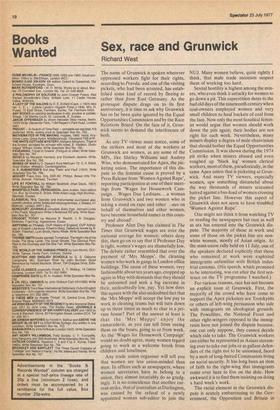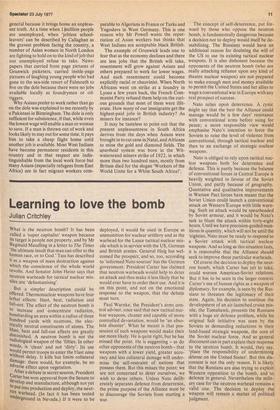Sex, race and Grunwick
Richard West
The name of Grunwick is spoken wherever oppressed workers fight for their rights, according to Pravda; and one of the visiting pickets, who had been, arrested, has established some kind of record by fleeing to rather than from East Germany. As the grotesque dispute drags on to its first anniversary, it is time to ask why Grunwick has so far been quite ignored by the Equal Opportunities Commission and by the Race Relations Board. 'On the face of it, Grunwick seems to demand the interference of both.
As any TV viewer must notice, some of the strikers and most of the workers at Grunwick are women, as are some of the MPs, like Shirley Williams and Audrey Wise, who demonstrated for Apex, the picketing union. The importance of this dispute to the feminist cause is proved by a Press Release from 'Women Against Rape', reporting participation at one of their meetings from 'Wages for Housework Campaign. . .Wages Due Lesbians. . .a woman from Grunwick's and two women who in taking a stand on rape and other • mes on behalf of themselves and other women, have become household names in this country and abroad'.
Professor Alan Day has claimed in The Times that Grunwick wages are over the national average for women; others deny this, then go on to say that if Professor Day is right, women's wages are shamefully low. The debate rather resembled that over the payment of 'Mrs Mopps', the cleaning women who work in gangs in London office buildings. The cause of these women, very fashionable about ten years ago, cropped up again in May with demands that they should be unionised and seek a big increase in their, undoubtedly low, pay. Yet how does this square with the also undoubted fact that the 'Mrs Mopps' will accept the low pay to work in cleaning teams but will turn down up to three times as much to char in a private house? Part of the answer at least is that the 'Mrs Mopps' enjoy the camaraderie, as you can tell from seeing them on the buses, going to or from work. As the 'Wages for Housework Campaign' would no doubt agree, many women regard going to work as a welcome break from children and loneliness.
Any trade union organiser will tell you that women are less union-minded than men. In offices such as newspapers, where women secretaries have to belong to a union, they almost invariably do so grudgingly. Ills no coincidence that another current strike, that of journalists at Darlington, was caused by the refusal of a newly appointed woman sub-editor to join the NUJ. Many women believe, quite rightly I think, that male trade unionists suspect them of working too hard.
Sexual hostility is highest among the miners, who even think it unlucky for women to go down a pit. This superstition dates to the bad old days of the nineteenth century when coal-owners employed women and very small children to haul-buckets of coal from the face. Now only the most fanatical feminist would argue that women should work down the pits again; their bodies are not right for such work. Nevertheless, many miners display a degree of male chauvinism that should bother the Equal Opportunities Commission. It was shown during the 1974 pit strike when miners abused and even roughed up 'black leg' women clerical workers, most of them, paradoxically, in the same Apex union that is picketing at Grunwick. And many TV viewers, especially women, spiv something distasteful about the way thousands of miners screamed hatred against a bus-load of women crossing the picket line. However this aspect of Grunwick does not seem to have troubled 'Women Against Rape'.
One might not think it from watching TV or reading the newspapers but race as well as sex has entered into the Grunwick dispute. The majority of those at work and some of those on the picket line are nonwhite women, mostly of Asian origin. At the mass union rally held on 11 July, one of the speakers declared explicitly that those who remained at work were exploited immigrants unfamiliar with British industrial customs. (His speech, which promised to be interesting, was cut after the first sentence on the TV programme I watched.)
For various reasons, race has not become an explicit issue at Grunwick. First, the majority of the crowd who have come to support the Apex picketers are Trotskyists or others of left-wing persuasion who side with immigrants on ideological grounds. The Powellites, the National Front and other right-wingers opposed to the immigrants have not joined the dispute because, one can only suppose, they cannot decide which side to take. The Grunwick workers can either be represented as Asians streaming over to take our jobs or as gallant defenders of the right not to be unionised, faced by a mob of long-haired Communists living on social security. It has long been an item of faith to the right-wing that immigrants come over here to live on the dole. How awkward it is to find them insisting on doing a hard week's work.
The racial element in the Grunwick dispute is acutely embarrassing to the Government, the Opposition and Britain in general because it brings home an unpleasant truth. At a time when 1million people are unemployed, when 'jobless schoolleavers' can be described by Callaghan as the gravest problem facing the country, a number of Asian women in North London are fighting to hold on to the kind of job that our unemployed refuse *to take. Newspapers that carried front page pictures of Grunwick picketers, carried inside-page pictures of laughing young people who had gone to the sea-side resort of Falmouth to live on the dole because there were no jobs available locally as foundrymen or oilriggers.
Why Asians prefer to work rather than go on the dole was explained to me recently by a Pakistani in Birmingham. The dole is only sufficient for subsistence, if that, while even the lowest wage will enable a man or woman to save. If a man is thrown out of work and looks likely to stay out for some time, it pays him to take a cheap flight home until another job is available. Most West Indians have become permanent residents in this country and in that respect are indistinguishable from the local work force but many Asians (especially refugees from East Africa) are in fact migrant workers corn
parable to Algerians in France or Turks and Yugoslays in West Germany. This is one reason why Mr Powell wants the repatriation of Asian workers but thinks that West Indians are acceptable black British.
The example of Grunwick leads one to fear that as the economy declines and there are less jobs that the British will take, resentment will grow against Asians and others prepared to work for lower wages. And such resentment could become explicitly racial or chauvinist. When North Africans went on strike at a foundry in Lyons a few years back, the French Communist Party refused them help on the curious grounds that most of them were illiterate. How many of our immigrants get the highest-paid jobs in British industry? As miners for instance?
It may be tasteless to point out that the present unpleasantness in South Africa derives from the days when Asians were brought in to cut cane inNatal, and Africans to mine the gold and diamond fields. The apartheid system was born in the Witwatersrand miners strike of 1922, in which more than two hundred men, mostly from Britain died for the slogan `Workers of the World Unite for a White South Africa!'







































 Previous page
Previous page